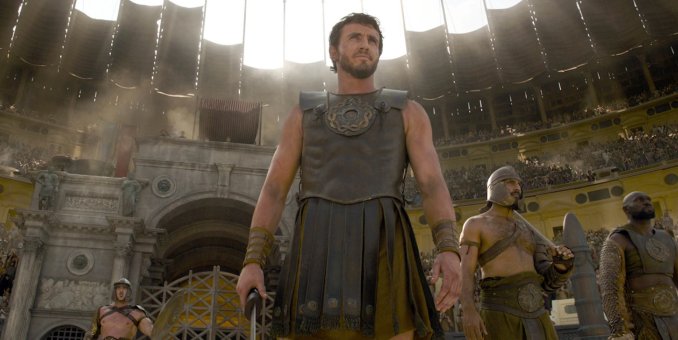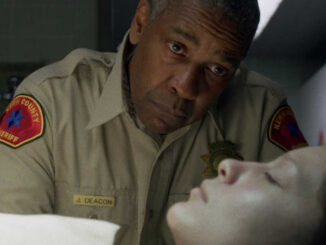
So in the past few days since I screened Gladiator II, the long awaited sequel to director Ridley Scott’s 2000 Oscar-winning blockbuster Gladiator, I have found myself thinking about the differences between the words “spectacle” and “epic.” Many people, myself most probably included at times, can use them interchangeably, especially those of us who write and want to avoid repeating the same word choice over and over. But at their core, I think, is a stark difference that marks them as being somewhat incompatible as synonyms. Spectacle can refer to something as visually striking while the classic definition of epic connotes an emphasis on the heroes performing the deeds that some would consider spectacle. And while Gladiator certainly delivered on spectacle and epic in equal measures, Gladiator II skimps somewhat on the characters that make up its epic story.
Gladiator II centers on Lucius (Paul Mescal), who is living a humble married life in the North African city of Numidia when a Roman legion led by Marcus Acacius (Pedro Pascal) invades, claiming the land for the Roman Empire. Having seen his wife fall in the defense of the city and himself captured and sold into slavery, Lucius vows revenge on Acacius. He is offered that chance by Macrinus (Denzel Washington) who has bought Lucius to serve as a gladiatorial combatant in Rome’s Colosseum. When they get to Rome two things are revealed – Macrinus has more in mind than just gambling on his gladiator and Lucius is instrumental in those plans, and Lucius is actually the grandson of former Roman Emperor Marcus Aurelius and as such has a greater claim to the throne than the currently ruling twins – Geta and Caracalla. All of this is prelude to a confrontation in the Colosseum that is very much in keeping with the Greek tragedies of yore.
For a film with an approximate two-and-a-half hour running time, Gladiator II feels remarkably thin at times. There is a lot going on, but much of it only gets a surface-level look. We are never given any real insight into any of Lucius’s comrade-in-arms in the gladiatorial games, outside of one character who acts as a doctor to the fighters and helps serve up some plot exposition when needed. Everyone else is a blank slate, faceless and nameless grist for the mill of the story. I guess in that way, we the audience are the same as the Romans in the Colosseum’s stands, cheering the fighters on, their brutality and death our entertainment. This is in stark contrast to the original Gladiator, in which we got to know at least a little something about many of the smaller, supporting characters, so we would feel something if they were met with an unfortunate fate. Likewise, the machinations of the conspiracy amongst certain senators to unseat the Twin Emperors is only given some perfunctory scenes, just enough to push Lucius’s character along the road that will lead him to a confrontation on the field of the Colosseum.
The main performances are uniformly at least good, carrying the movie’s lightweight story handily. Mescal’s Lucius may not be as charismatic as his father was in the first film, but he does have a solid presence in the film, handling both acting and action moments well. Connie Nielsen returns from the original film as Lucilla, Lucius’s mother who sent him out of Rome when he was a child to protect him from the intrigues that threatened his life. Having that backstory certainly helps to add some dimension to Nielsen’s performance and she plays with it well. Pascal, as her new husband who shares her concerns about Rome’s decline, plays his conflicted character with a certain amount of sympathy, so we are concerned about his inevitable final confrontation with Lucius.
Also notable is Tim McInnery who does some great work as a sniveling, lickspittle Roman senator, making the most of an underwritten part. Derek Jacobi, the only other returning actor from Gladiator, is given even less, a disappointment considering his talents. His presence feels almost like a perfunctory link to the first film, and leaves one wishing for more screen time from him.
The only actor here who really shines is Washington as Macrinus, who certainly seems to be having a ball with his performance. Washington shades the various faces that Marcinus wants different people to see, so some just perceive him as a hedonistic gambler while a select few get to see the vengeful schemer that lies below the surface. But early on, we the audience know what a dangerous man he can be, and we continue to see hints of that even if the other characters around him miss those cues.
Director Scott once again recreates the majesty of Ancient Rome on the big screen, though this time we see it as an empire teetering even more and more towards collapse. The Twin Emperors are in various stages of madness and no one seems willing to openly do something about it. The growing class divide is seen in the impoverished people crowding the carts bring the gladiator slaves to the Colosseum, begging for money or food. But beyond that, he gives us sweeping vistas of ancient Rome, legions of armies clashing and the thrill of those in the gladiatorial arena fighting for their lives. But ultimately, those games in the Colosseum serve as a metaphor for the film itself. Lots of spectacle, while everything else around it is crumbling.





